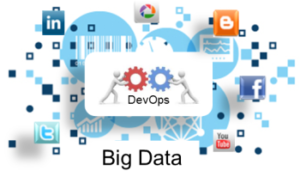
Extracting meaningful and accurate insights from big data is a rigorous process. And it is more challenging due to lack of coordination between IT operations and big data software developers that is prevalent in several cases. Big data projects remain to isolate for distinct reasons even most IT organizations practice sound strategies of DevOps for other supported applications.
If you work with Big Data, Have a glance on why Big Data and DevOps together make sense as follows:
DevOps
DevOps is a software development philosophy and delivery which emphasizes constant communication across the organization. It reflects a streamlining effort to software production streamline by eliminating the barriers, which have separated developers from IT Ops teams and everyone in between.
A crucial and closely related concept to DevOps is the idea of continuous software delivery. Under the ongoing delivery model, the code is written, designed, tested and pushed on a constant basis into production environments.
Big Data and DevOps
If the goal of DevOps is to perform active software production and delivery, then continuously including data specialists and delivering can be a big boon for the organizations, which are working to embrace DevOps. That’s the reason, according to a recent analysis it is now a mainstream practice among the most significant organizations.
Organizations by Integrating Big Data and DevOps can achieve the following:
More Efficient Planning of Software Updates
Software mostly interacts with data in some way. When you are redesigning or updating an app, it is essential to have the most accurate understanding of all types of data sources that your app will be working. And it is better for developers to understanding as soon as possible.
Lower Error Rates
The principle of DevOps, i.e., “shift-left” testing that emphasizes the change in the testing code of the development cycle. Active collaboration is essential between DevOps teams and data experts to find and fix data related errors in an application.
Considering these consequences, collaborating with data experts before starting new code and help programmers in planning updates in the most efficient way from the perspective of data is recommended.
Maintaining Consistency between Development and Production Environments
The primary emphasis of DevOps movement is on the necessity of creating development environments is mimic real-world productions as many as possible. It is a tough job for non-data specialists to achieve the working of software that works with Big Data. In the real world, the data diversity types can vary enormously. Therefore, it is essential to maintain the quality of data that software has to work.
Data experts through their involvement in the process of software delivery can help the rest of the team understand distinct types of challenges there will face in production.
Acquiring Feedback from Production
The final part of this continuous delivery process deals with collecting data from the production environment after releasing the software and then using the same to help understand the strengths and weaknesses of the software and so you can plan for the next update. The entire process depends in part on admins work, which helps monitors and maintains software in production.
The fact is that no one is entirely qualified to analyze the data related to production that can conclude things like statistics of app health such as memory usage, CPU time and so on, the user’s number and location are more than data experts.
Conclusion
By contributing to the analytical skills of data to the feedback process of DevOps, data experts can help in understanding the possibility of what’s working on the DevOps continuous delivery chain and what is not working.
The distinct process that data experts involved in continuous delivery processes could continue. The overarching message is that “Big Data and DevOps he teams can benefit from work together. If you want to make your operations of software delivery as efficient as possible by adopting DevOps, don’t forget to include data analysts within the workflow of DevOps implemented.


